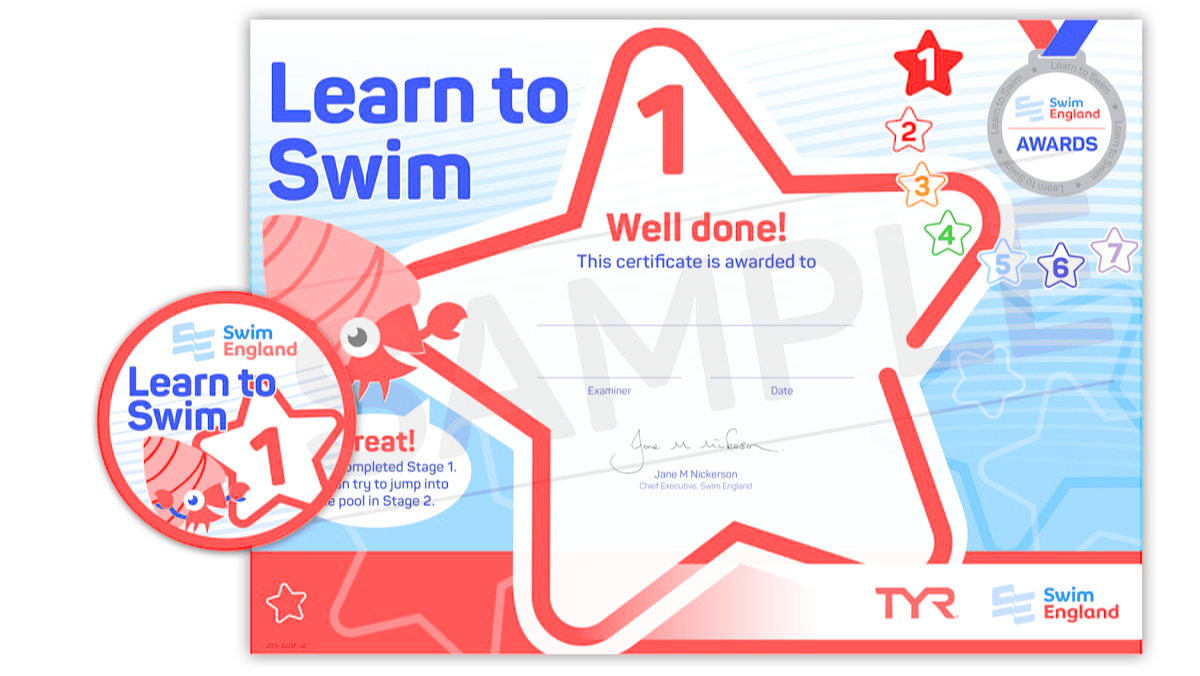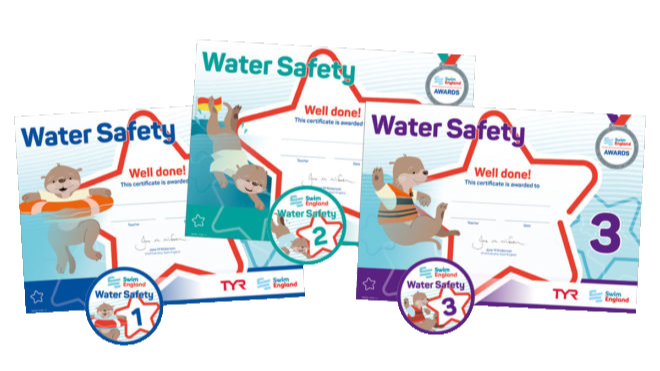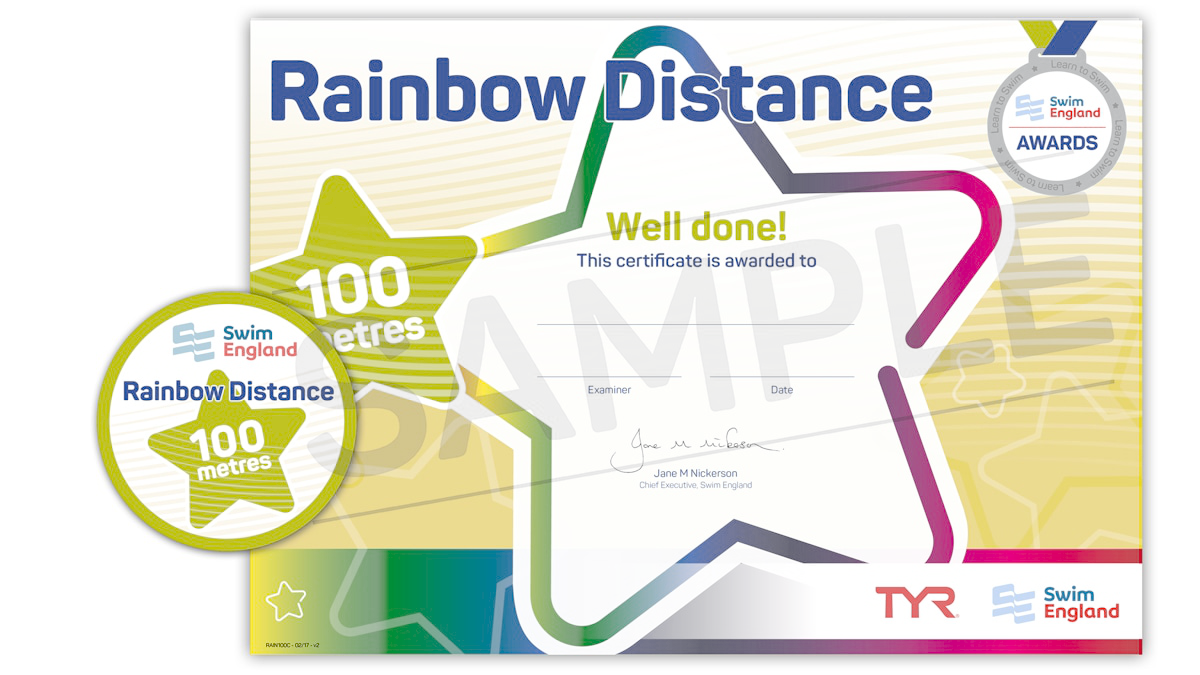
Stages and awards
Winchester City Penguins lessons, stages and awards information



Our Lessons Programme follows the Swim England Teaching Programme and award Swim England badges and certificates. Testing is carried out for all students towards the end of each term. However, students don’t have to wait until the end of term to move up.Instructors will recommend to the lesson’s supervisor if at any point they feel a student is ready to progress to the next level.
A child entering the programme in Stage 1 at 3 years of age can be expected to progress between stages on average once every 2-3 terms.Children that have swum continuously throughout the year will generally complete Stage 7 by about age 9.
Once swimmers have completed Stage 7, they have the opportunity to enrol in our Swimming Academy (Discovery, Primary and Junior Challenge Squads). Those displaying the potential and enthusiasm are encourages to consider entering one of our competitive squads which involves training several times a week and taking part in galas.More detailed information on the testing criteria for any of the stages is available on request from [email protected]
WCPSC
Little Penguins
Little Penguins is a parent-assisted swim lesson for children aged from 18 months to 4 years. These classes have parents involved and are designed for children to enjoy swimming at a critical developmental age. Children will develop essential safety skills and confidence in the water, while having fun and learning to enjoy swimming environments!
The class sizes is five swimmers - 5 parent or guardian : 1 teacher
Class duration is 30 minutes Held at Kings School and Oaklands Community Pool on Saturdays and Sundays, at a cost of £13.50 per lesson.
WCPSC
Stage 1
The early stages are really important for developing the building blocks for future technique and the skills that are learnt should be fun and enjoyable.
During Stage 1, children will be encouraged to move around the pool and become confident with water on their face as well as learn safety skills such as floating and entering / exiting the water.
Stage 1 swimmers are supported and assisted in the water by either a teacher or teaching assistant (helper).
We aim for a ratio of 2 swimmers per member of staff.
To pass stage 1, swimmers must be able to kick independently on their front and back for 3-5m.
In addition to the Stage 1 award, swimmers will also have the opportunity to earn the Puffin Award, the I Can Blow Bubbles, I Can Jump In and I Can Float on My Back Awards and the Duckling 1 and Duckling 2 Awards.
WCPSC
Stage 2
Swimmers are introduced to basic stroke technique and aquatic breathing.
They will develop basic floating and learn how to rotate to regain an upright position without support.
Stage 2 further develops water confidence and teaches swimmers to breathe confidently while in the water.
Being confident with the face in the water, or having water on the face, is crucial to stroke development.
To pass stage 2, swimmers must be able to swim 5m basic front crawl (without correct breathing technique) and backstroke as well as basic breaststroke kick with assistance.
In addition to the Stage 2 award, swimmers also have the opportunity to earn the Rainbow 5m Distance Award and the Duckling 3 Award.
WCPSC
Stage 3
During Swim England Learn to Swim Stage 3, swimmers will develop their kicks, on both their front and their back.
They streamline through push and glides, whilst also swimming underwater.
In this stage, swimmers begin to learn how to breathe to the side in front crawl, allowing them to travel longer distances independently. Water safety knowledge and rotation skills will also be progressed.
One of the fun areas of this stage is learning to go under the water to pick up an object. This helps develop skills for a number of different disciplines, including synchro, diving and competitive swimming.
To pass this stage, swimmers must be able to swim 10m front crawl and backstroke, with the ability to breathe to the side on their front. They should also be able to perform breaststroke kick with a float and dolphin wiggle.
In addition to the Stage 3 award, swimmers have the opportunity to earn the Rainbow Distance 10m and 25m Awards.
WCPSC
Stage 4
Swim England Learn to Swim Stage 4 sees swimmers perfect their leg kicks for all four strokes and further develop push and glides, while also being introduced to sculling.
They will develop an understanding of buoyancy through a range of skills and should swim 10 metres to the Swim England Expected Standards.
By the end of this stage, swimmers are expected to have a clear ability to perform recognisable leg kicks for all four strokes.
In addition to the Stage 4 award, swimmers have the opportunity to earn the Rainbow Distance 10m, 25m and 50m Awards, also the Rainbow Stroke 5m Award in front crawl, backstroke, breaststroke, butterfly and the Preliminary Safety Skills Award.
WCPSC
Stage 5
During Swim England Learn to Swim Stage 5, swimmers will develop their skills in treading water and learn how to do handstands and somersaults. They will also continue to develop their stroke technique, introducing breaststroke and butterfly arm pulls.
This means they will be required to perform all strokes to the Swim England Expected Standards.
The emphasis is on ensuring all work done in the previous stages is developed further.
A key activity in Learn to Swim Stage 5 is sculling, which is an important skill to master as it is not only prevalent in artistic swimming, but is also vital to ensuring water safety.
Learning to tread water is an important area of development and again is a crucial lifesaving skill.
In addition to the Stage 5 award, swimmers have the ability to earn the Rainbow Stroke 10m Award in all four strokes, their Rainbow Distance 25m, 50m and 100m Awards and a Safety Skills Award.
WCPSC
Stage 6
At Stage 6, swimmers should have a solid understanding of all 4 strokes. At this stage, skills such as streamlining, somersaults and basic competitive starts/turns are taught.
Swim England Learn to Swim Stage 6 teaches swimmers how to prepare for exercise, while developing an efficient technique for all four strokes over longer distances.
By the end of this stage, swimmers will be able to swim 25 metres of all four strokes to Swim England’s Expected Standards.
Swimmers will also learn to swim in clothes and understand how to be safe when they’re in and around water.
In addition to Stage 6, swimmers have the opportunity to earn the Rainbow Distance 25m, 50m, 100m and 200m Awards and work towards their Personal Survival 1 Award.
WCPSC
Stage 7
Swim England Learn to Swim Stage 7 continues to develop strokes over longer distances, without losing focus on technique.
Swimmers should develop a quality stroke technique for up to 100 metres, incorporating the skills they have learnt throughout the stages and combining them to develop a linked routine.
They should successfully complete an obstacle course, which combines a variety of skills they have learnt from Stages 1 to 7.
Swimmers will have developed a range of skills in previous stages and these are now brought into a sequence.
By the end of this stage, swimmers will be able to swim 25 metres of all four strokes to Swim England’s Expected Standards. Swimmers will also be able to complete a continuous swim of 100 metres using three of these different strokes.
In addition to the Stage 7 award, swimmers have the opportunity to earn the Rainbow Distance 200m and 400m Awards and work towards their Personal Survival 2 Award and their Bronze Challenge award.
WCPSC
Stage 8
In Stage 8, swimmers focus on smaller details of stroke technique and continue to build their stamina.
There is a focus on starts, turns, learning to work off the clock to complete sets and beginning to learn skills associated with water polo.
In addition to the Stage 8 award, swimmers have the opportunity to earn the Rainbow Distance 600m and 800m Awards.
WCPSC
Additional awards
As well as progressing throughout the Stages, we offer a number of additional awards which swimmers can achieve. Below is a list of what we offer.